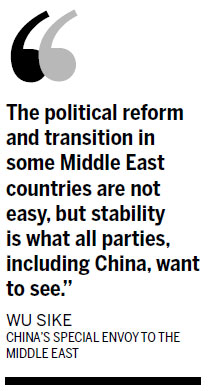China plays bigger role in Middle East
Ever since China's new leadership emerged last year, the country has been playing a bigger role in trying to resolve key regional issues in the Middle East, observers said.
Such efforts will continue, especially when breakthroughs are likely, as was the case with the destruction of Syria's chemical weapons, the implementation of an interim Iranian nuclear deal and the creation of a political roadmap for an Egyptian presidential election this year, they said.
"China's voice in key regional issues is greater than before. China has put forward detailed propositions last year to resolve them and gained recognition there. This was rare before," said Yao Kuangyi, former Chinese ambassador to Turkey.
He said China can help the turmoil-ravaged countries rebuild their infrastructures and offer humanitarian aid for the many displaced people, as political chaos in West Asia and North Africa, starting with Tunisia, has lasted for more than three years.
The remarks came after Foreign Minister Wang Yi's interview with Al Jazeera, in which he said China's political role in the Middle East "will only be enhanced, not diminished".
"China's all-round role will gradually and more visibly be felt by Arab countries, and will get their understanding and support," Wang recently said in the TV interview, according to a news release from the foreign ministry on Thursday.

The interview, broadcast on Wednesday, came weeks after Wang concluded his first official visit to the Middle East since becoming Beijing's top diplomat in March.
Wang visited Palestine, Israel, Algeria, Morocco and Saudi Arabia from Dec 17 to 26, marking the first visit to Israel by a Chinese foreign minister since 2009.
Calling Wang's visit a "rare high-level visit", Israel's Jerusalem Post said that China historically has not taken much of a role in the conflict, but in recent months "it has signaled an interest to become more closely involved".
"It is true that Chinese-Arab cooperation in recent years has mainly focused on the economic field. That is because we believe that development holds the key to and serves as the foundation for solving all problems," Wang said.
China's trade volume with Arab states in 2012 was $222 billion, a 13.5 percent increase from 2011. China is also a main importer of the region's crude oil.
Wu Sike, China's special envoy to the Middle East, said relations between China and the Middle East are not only about energy or economies.
"The political reform and transition in some Middle East countries are not easy, but stability is what all parties, including China, want to see," he said.
Contact the writers at zhaoshengnan@chinadaily.com.cn and mojingxi@chinadaily.com.cn
(China Daily 01/10/2014 page11)














